
阅读·实修·转化
729 Changle Road: The Chinese Dream on a Road in Shanghai | Shi Mingzhi
Beast Press: Two versions by the same author, the first version of the Taiwan version was published in 2017, and the mainland version was published in 2018. By comparison, it is found that the mainland version has deleted the core personnel, and it is not explained in the book. I was quite fond of this documentary series by Shanghai Translation before, and I bought and read most of them. Now it's time to be suspicious. It is understandable to delete, but at least you have to be honest and say that you are an abridged version.
Title: Changle Road: The Chinese Dream on a Road in Shanghai
Original title: Street of Eternal Happiness: Big City Dreams Along a Shanghai Road
Author: Shi Ming
Real name: Rob Schmitz
Translator: Ye Jiayi
Publisher: Times Publishing
Publication date: 2017/09/12
Language: Traditional Chinese
Price: 420 yuan
brief introduction
Across three generations, building the Chinese dream on a road in Shanghai
Every real life story is the hope and sorrow of today's Chinese people
An American journalist who has lived in China for 20 years, outlines the face of China today
If you haven't read this book, you shouldn't think you know China
"People always have big dreams, no matter where they are in China, personal dreams, or grand Chinese dreams... This is a unique era, and I hope to capture the subtle feelings of this era." -- Rob Schmitz )
Today's Shanghai is an international metropolis, and it is also undergoing tremendous changes. Every day, countless people who embrace the Shanghai dream continue to pour into this torrent of capital, ideas and opportunities. Well-known American journalist Shi Mingyi is one of them.
In 1996, he first arrived in Sichuan, China as a Peace Corps volunteer. Six years after moving to Shanghai in 2010, he decided to write about China with the theme of his living environment. He lives on Changle Road in the former French Concession in Shanghai. He not only integrates into the local life, but also develops deep friendship with the residents. This book depicts how these ordinary little people see the future sky from the Shanghai skyline, and how they create new opportunities for destiny.
In the book, Chen Kai, born in the 1980s, "escaped" from a state-owned enterprise in a small town to another province, made his first pot of gold by selling Italian accordions, and later opened a small shop with a friend; he is a symbol of China's future, A literate but angry young man whose dreams are lost between the big city and the countryside. Another character in the book, Aunt Fu, born in the 1950s, is a champion of capitalism and is constantly looking for ways to get rich quickly; she is a lost generation, living a life of frustration and poverty, and showing anger at the inequality in China today vulgar. What amazes the author is a box of mysterious letters that have been covered in dust for decades. It is full of endless power and greed. It not only changes the fate of the people in the desolate community, but also uncovers not only the past of a family, but also the dark history of China. .
This book is about the life stories of ordinary people in China in the 21st century, depicting each generation with unique characters. Through this book, readers can understand the hopes and sorrows of these people in pursuit of their dreams. An American journalist who has lived in China for 20 years, with the real story of Changle Road in Shanghai and the ordinary people living in it as the protagonists, outlines the true face of today's Chinese society and interweaves into a wonderful and vivid picture of all beings.
Highly recommended
Independent reporter Bai Xiaohong
Freelance writer Wang Hao
crossover critic category
──Recommended
Amazon online bookstore 5 stars praise
World Magazine's Best Books of the Year
The Telegraph's Best Books of the Year
New York Times Book Review
The Economist
The Guardian
Unanimously praised
"This book is both amazing and delightful... Through the author's experience of living on Changle Road, readers can better understand ordinary Chinese people."—The New York Times Book Review
"Many stories along a road in Shanghai outline the face of today's China." - The Economist
"The author's real-life story shows how Chinese government policies prevent people from pursuing their dreams." - The Guardian
"The author intersperses his stories with historical facts, leading readers to understand the complex changes that Chinese culture is going through."—Publishers Weekly
"The author exposes the corruption and incompetence of the government under China's active economy, which has ruined the lives of countless people... But life in Shanghai has a softer side." - "Book List"
“As long as you have read this book, you cannot see the rise of China or the China model in the same way. Years later, people will use this book to understand China in this era again.” – James Fallows, senior media person
"Changle Road is a Shanghai-themed reportage. This road reflects the complex contradictions and surprising interesting perspectives of today's China." - Peter Hessler, "Pathfinder China" "author
"Shi Ming has made a precious record for us. He patiently described this impatient country and the real joys and sorrows, greed and tenderness of people's lives." - Evan Osnos, author of "Age of Ambition"
"In this intimately recorded book, we see a street of about three kilometers that embodies the dreams and unease of modern Chinese people." - Leslie T. Chang, author of "Factory Girl"
"Changle Road is an interesting, moving, tragic, but laudable read. If you haven't read this book, you shouldn't think you know Shanghai or contemporary China." - Adam Minter , author of "How much is a ton of garbage worth"
"A great city has a book that captures its ups and downs, and Changle Road belongs to Shanghai." - Michael Meyer, author of "In Manchuria"
"This is a kaleidoscope of Chinese history, from famine and the Cultural Revolution to the one-child policy. Most importantly, these stories document the suffering and hope of living the Chinese dream, written with penetrating insights and captivating fluency. "—Mei Fong, author of "Only Child"
"Reading this book is like returning to your grandmother's house after a 20-year absence, meeting many old neighbors, and life is still so hard, would you believe it? But these are true stories." - Wang Hao, "The Unexpected Father of the Nation" author
About the Author
Rob Schmitz, Master of Journalism, Columbia University, Shanghai correspondent for National Radio (NPR) and broadcast media Marketplace. In 1996, he went to China for the first time as a Peace Corps volunteer. He is the second reporter who has obtained the consent of Apple and Foxconn to enter the factory for interviews. In 2012, he won the IRE Awards for writing an article criticizing American actor Mike Daisey for fabricating Foxconn sweatshops on TV. He has been awarded the Edward R. Murrow Award, the Educational Authors Association (EWA) Medal. This book is his first book.
Translator Profile
Ye Jiayi
Muzha, now a full-time translator. He has published a collection of novels "Overflow", "Dyeing", and a collection of essays "Insecure Desires", translated as "Philosophy in the Age of Horror: with Jurgen. Habermas & Jacques. Deshida Conversations, A Life Stolen, Heart of Death, Homecoming, A Diary With Missing Pages, The Daughter Taken, Why Mahler? : The Musician with the Most Fanatical Music Fans in History", "Mr. Stone and His Knight Companions" and more than a dozen.
Table of contents
Guide Reading A Road Tells the Story of Contemporary Chinese Society Bai Xiaohong / Independent Reporter
Chapter 1 CK and System: No. 810, Changle Road
Chapter 2 Cities, Better Life: Maqueri
Chapter 3 Lively: No. 109, Changle Road
Chapter 4 Re-education: No. 169, Changle Road
Chapter 5 A Box of Letters: No. 70, Lane 682, Changle Road
Chapter 6 Aunt Fu's get-rich-quick scheme: No. 169, Changle Road
Chapter 7 The Price of the Bride: No. 109, Changle Road
Chapter 8 Cultural Youth: No. 810, Changle Road
Chapter 9 The Plundered Dream: Maqueri
Chapter 10 Escape: No. 70, Lane 682, Changle Road
Chapter 11 Zero Risk: No. 169, Changle Road
Chapter 12 Rural Wedding: No. 109, Changle Road
Chapter 13 CK's Pilgrimage: No. 810, Changle Road
Chapter 14 Home
Chapter 15 Chinese Dreams
Guided reading
A way to tell the story of contemporary Chinese society
Bai Xiaohong/Independent reporter
Over the past ten years, every time I went back to China, I observed that people's self-confidence became stronger and stronger. This self-confidence sometimes manifests itself in an anti-imperialist view of history, and sometimes it manifests itself in an aggressive nationalist sentiment. I remember that on the train from Beijing to Urumqi six years ago, several Chinese people talked about international politics. A young man expressed his opinion on the relationship between China and Southeast Asian countries, believing that China needs to be "tough". He said angrily, "We can hold our heads up today! Today's China is different. China has risen!"
The expectation of "China's rise" is most fully realized under Xi Jinping's "Chinese Dream" slogan. It is up to the country to talk about the dream, then the dream must be universal and comprehensive. It must be "the great cause of rejuvenation of the entire Chinese nation". And what does this "Chinese Dream" mean to the Chinese people? Whose dream does it represent?
"Changle Road" written by Rob Schmitz, a China-based correspondent for Marketplace, uses the voice of the Chinese people to explore the meaning of the "Chinese Dream" advertised by the country. Shi Mingming wrote this authentic, first-hand reportage based on his observations and experiences around life during the time he lived in Shanghai since 2010, which can be said to be a microcosm of the life of the contemporary Chinese people. story. His characters focus on Changle Road, where he and his family lived for six years, a road that used to belong to the French Concession and is rich in stories.
"Changle Road" can be seen as part of the trend of writing about China in the West over the past decade: writing in a microscope to present the big society. It focuses on a community, a road, and presents social changes from personal growth and struggle experiences, and highlights the relationship between personal development and the larger system. The characters in "Changle Road" come from all walks of life. They strive for survival and progress in the changing times and the national system. Their personal expectations and dreams are constantly frustrated, compromised, and distorted in the system, but they must continue on.
The story of "Changle Road" shows the changes in this city under the reform and opening up, and these changes do not represent progress. Since the 1990s, Shanghai has undergone a transformation from the construction industry. People’s houses can be demolished if the local government wants to demolish them. Since the land belongs to the state, if the houses are demolished for any development and reconstruction, the people are helpless except for small-scale protests. Local governments rely on batches of construction projects to make money in this way. Local officials are rich, developers are rich, and a little compensation is given to residents. Those who do not want to be demolished have their fate for all to see: they are threatened, violently treated, and even killed.
In "Changle Road", there was an old couple in the building where Shi Mingming lived. Because they refused to move, they were set on fire by hooligans hired by the developer. This unheard-of tragedy caused by the system of mutual benefit between government and business is constantly opposed by the country's "street spirit education" in Shi Ming's writings: "The city makes life better" and "civilization" slogans fill the public advertising space, It requires the people to work together to "shape a civilized city". Every important festival, the local government strengthens spiritual education. For example, a few months before the expo, all citizens received a "Etiquette Booklet" with a thickness of more than 200 pages, urging everyone to "How to be a good Shanghainese". The guide includes how to cut hair, how to eat western food. This is the tragic farce that appears from time to time in "Changle Road", or in other words, the tragedy (the death of the people) is expressed by farce ("Street Spirit Education").
Whether or not the country's "Chinese Dream" is the dream of the people is best answered by the hundreds of millions of migrant workers in Chinese cities. In order to achieve the ideal well-off society, one part of the "Chinese Dream" is to control urbanization. For the Chinese rulers, "if the urban population is not managed well, the country will be in chaos". During the 30 years of reform and opening up, many farmers have decided to leave their hometowns and go to cities to change the lives of themselves and their families. After China opened up to the world market, various manufacturing industries developed in the country needed labor. When rural men and women came to the cities to make a living, cities like Shanghai also became the world's factories. One of the most prominent characters in "Changle Road" is Miss Zhao from a mining village in Shandong. Like millions of rural people, she came to Shanghai full of longing, a place with a beautiful name for her.
And Shanghai is not the beautiful city in her dreams. After two years of hardship on the assembly line of an electronics factory, the boss fired Miss Zhao, who was 31 at the time. His reason was that she was too old. Crying and begging is useless, the factory policy is that female workers must leave when they reach the age of twenty-five. Where are the regulations governing employment rules and labor conditions in these factories? The national policy is concerned with maintaining such a system: those who come from rural areas to work in cities can only sell the cheapest labor, and cannot enjoy the rights enjoyed by any urbanites.
Under the household registration system, Ms. Zhao's children could not go to school in the city and became "left-behind children". "Left-behind children" make up one-fifth of China's child population. Miss Zhao brought her eldest son to the city, and wanted her to study hard and grow up in Shanghai. But after the school knew his household registration, he had to suspend school immediately and return to the mining village. Her second son is autistic and mentally anxious because his mother is far away in Shanghai.
During my visit to China, I have seen many children brought by migrant workers who cannot enjoy equal rights to education in big cities, are not accepted by schools, cannot enroll in school, and can only set up their own children in the migrant worker community. Schools that lack equipment. For example, when I was in Beijing, I saw that the schools of these spontaneous migrant workers' children were closed one by one because they did not conform to school building norms. The children of migrant workers have nowhere to go to school because the state does not give them equal rights to education. The welfare and personal development of these children is not the concern of the China Dream. They can only protect themselves in the gaps in the system. A migrant worker in Beijing once said to me, "We all live under the same sky, why don't we have the same rights as them?"
Miss Zhao in "Changle Road" asked the same question. She and her children have experienced for years what is "urban violence": social isolation in cities caused by state policies. She knew that for people of her class, the realization of her dream would have to be earned through hardship all her life. Or even a lifetime of hardship to earn. The identity of farmers in China has never changed, no matter how China changes, how it rises, how strong it is. As a peasant, even if you struggle all your life in the city, you are still a peasant. "Changle Road" tells the story of her unyielding spirit and her struggle with the system.
With his personal observations and delicate words, Shi Ming has described the dreams of many Chinese people. "Changle Road" records not only the story of a road, but the story of today's Chinese society. It is a deep questioning and critique of the "Chinese Dream" shaped by the rulers.
book summary
Changle Road is about three kilometers long. When the intertwined branches and branches of the road light up in winter, you can see the famous skyline of the city in the distance: Jin Mao Tower, Shanghai World Financial Center, Shanghai Tower. The three giants stand a few blocks away, each taller than the Empire State Building in New York.
The people under the road tree were too busy to enjoy the view. In the Shanghai No. 1 Maternity and Infant Health Hospital in the middle of Changle Road, many newborns started their first days of life; in the emergency room of Huashan Hospital on the west side of Changle Road, many people passed the end of their lives. The section between the two courtyards is full of life: a beggar with a beard sits on the street and plays a bamboo flute, a couple walks past him hand in hand, a bunch of cars are blocked, two men honk their horns, and the two spit at each other. Arguing over who hit whom, students in uniform gathered around to watch, an old woman on crutches yelled at a peddler in disgust over the price of lychees, as for the other sections, they were pushed away by the constant stream of people, from time to time. There was a burst of salty aroma from the meat bun stall and the benzene sweetness of the traffic exhaust. Life here is loud, messy, and violent.
Changle Road on the map is nothing but a thin, winding line on the southwest side of People's Square in the center of Shanghai. My home is on the west side of this thin line. Looking out from my house is the canopy of trees, two stories high and shaded almost all year round. The only living things that stand still under that are the trees. There are many mornings when I weave around these tree trunks, from the sidewalk to the road and back, among pedestrians vying for shade.
Few streets in China are as full of trees as here. On weekends, the hustle and bustle of local workers is replaced by tourists from across China, who use their telephoto lenses to capture the two rows of branches and admire the exotic scenery. The trees were planted by the French in the mid-nineteenth century, when Europeans and Americans were carving up the city as a concession. Nearly a century later, the French left, but the tree remained. The Japanese bombed Shanghai and occupied the city at one point, but eventually retreated, leaving the French trees unscathed. Then came the revolution of the Communist Party led by Mao Zedong, the class struggle, and the untimely deaths of millions. The tree lives on without hindrance. This street is now full of capitalism, with restaurants and shops on both sides. As I stroll along the sidewalk, I occasionally catch a glimpse of decadent European-style homes through the gaps of the closed gates, thinking how much history this street has witnessed. Brutal turmoil. This place is like an imperial rose that withers and blooms again. Only these trees are always standing.
Having lived on this street for nearly three years, I just noticed Chen Kai's sandwich house. The store is less than a block from my apartment, above a small clothing store, and almost the entire store is blocked by lush plane trees on warm summer days. Walking from the narrow spiral staircase to the second floor, you will first see the whole floor-to-ceiling window, and a whole piece of branches and leaves swaying outside the window, isolating the hustle and bustle of Shanghai below.
Kai Chen—he always calls himself CK—sometimes works at the counter bent over, with tousled black hair that almost covers his eyes, thin fingers finishing a sandwich or dessert, then swaying his forehead mane. Hair like hair, turned around and waved a cup of hot coffee from the espresso machine for the customer with a mechanical movement. But the storefront is usually empty. "It's okay, it takes time to start a business, dreams are like that," he told himself. Whenever this time, he would sit decadently on the bar stool, with his pimple-covered boyish face facing the floor-to-ceiling windows full of tree shadows. He switches between different Chinese dialects when speaking on the phone, and does business as a sideline: he also sells accordions.
He wanted to open a sandwich house after visiting one in Chicago. It was the only trip to the United States in his life. It was a part of everyday life for Americans, but he was so impressed that he wanted to provide a similar experience to Chinese eat-out customers. It's a bit like an American who has been to China and is inspired by a small noodle stall to return home. This seemingly impulsive approach is true of many shopkeepers I know on this street. In a big and affluent city like Shanghai, you can sell almost anything if you want to.
CK dreams of one day making a living out of this artistic second-floor sandwich house. He invested the savings he had made from selling accordions over the years and co-founded the space with a friend, hoping to attract young musicians and artists like them.
“One day I suddenly had an idea: maybe I can bring these people together and unite. I want to find people who want to break free from the system. I want friends of the same kind; Entrepreneurs with independent ideas," he told me.
Many people have ambitions similar to CK's, and walking on Changle Road has become an amazing experience; the narrow streets are full of small shops and cafes similar to CK's stores, and bright-eyed strangers compete with their dreams. All want to pursue success in this big city.
Success is not easy. Neither CK nor his friend Max had any experience working in a restaurant, let alone operating it. They met in an antique camera shop in the former French Concession, where CK was working part-time to study photography. Like CK, Max also has an entrepreneurial background; after many long conversations with each other, the two appreciate each other's business skills in making and selling goods. Finally CK persuaded Max to partner with him to open a sandwich house.
They named the store "Your Sandwich House." It's only two blocks away from a busy subway station, next to a forty-five-story building, and hundreds of office workers pour out of the building at noon every day, looking for A quick lunch. But no one could see this "Your Sandwich House" blocked by plane trees, and no one looked up and saw them through the canopy as they hurried down Changle Road.
So they changed the store name to "Second Floor", implying passers-by to look up at them. Under the new store name, "Your Sandwich House" was written in a low-key and graceful font. They hired a new head chef, built a bar with a variety of drinks and imported beers, and were obsessed with playing tricks on the menu. One day I stopped by CK's apartment and saw a stack of electronic tablets in the corner. "Touch menu!" CK said to me with a smile. He must think that the boring menu that cannot be interacted is the reason why the i-generation young people cannot be attracted.
He made a quick buck selling accordions, but was naive as a restaurant operator. The lunch diners here are usually office workers who are struggling to earn rent. They are looking for cheap local food, and usually prefer cooked food that is eaten with chopsticks. Over the next few months, CK will have to grapple with this reality. He started offering affordable lunch specials and lowered the price of sandwiches slightly. However, he never worried about the fate of this fast food restaurant. After all, the profit from selling accordions is stable. Besides, he feels very lucky to be able to handle two businesses at the same time in his residence, like a squirrel who knows how to use resources in his own house for the winter. Cozy tree house stocked with nuts.
This sandwich house is a sanctuary within a sanctuary. The neighborhood was originally built as a shelter for outsiders. After losing the Opium War for the first time in 1842, the Qing Dynasty ceded parts of Shanghai and other port cities to Western powers. The French occupied this area of the city, converting once vast rice fields into exclusive neighborhoods, the French Concession established in 1849. Since then, France has provided shelter to vulnerable groups. For example, in 1860, when the Taiping Rebellion against the Qing Dynasty was launched by rioting peasants, this place hosted thousands of Chinese refugees seeking asylum. Since then, even though every Chinese leader in the city has expressed opposition, theaters, cinemas, and dance halls have continued to flourish under French protection, and soon churches, temples, and mosques have grown.
When the Communist Party took power in 1949, it slandered foreign concessions as a symbol of shame for being insulted by foreigners. But one fact was missed in their party propaganda: in 1921, at the age of 28, Mao Zedong met with other radical young people at a girls' boarding school deep in the French Concession to convene the Chinese Communist Party of the first national congress. Mao and his comrades chose this place precisely because the concessions provided shelter. Only here will the Chinese authorities in the city find them easy to find and avoid the fate of being arrested and put on trial, which would prevent the Chinese Communist Party from taking root and completely rewrite the historical destiny of China.
The French built the neighborhood to look like a typical Parisian city: these narrow, winding roads are lined with trees that the locals call "phoenix", which means "French poinciana", but they are neither from France nor Not Phoenix. Just as in the chaotic history of Shanghai, these trees are more cosmopolitan: they are the London sycamore, a hybrid of the oriental sycamore native to Central Asia and the American sycamore. In addition, the first London plane tree was actually found in Spain.
George - Eugene. Baron Georges-Eugène Haussmann was the driving force behind the world-famous London plane tree. The urban planner loved the leafy appearance of London plane trees, so in the 19th century, when he transformed Paris from chaotic small streets into broad avenues lined with trees, he planted London plane trees all over the city. . It didn't take long for the London plane tree to appear all over the world, and to this day, it occupies many of the world's largest cities, such as Rome, Sydney and New York. Its leaves are similar to maple trees, and it is now the badge of New York City's parks.
Two-thirds of Shanghai road trees are London plane trees. Urban planners call them "supertrees" because of their shallow roots and resistance to soot, extreme temperatures, and insect infestations. The planting spacing between trees is about five to seven meters. When pruning, a technique called "pollarding" must be adopted. One side is cut off to stimulate the growth of branches to the opposite side of the road. The branches of the trees tangle above the pavement to form dark green tunnels two to three storeys high. This green arcade shields pedestrians from the sweaty summer sun and the violent storms that frequently sweep from the East China Sea.
I moved to Changle Road in 2010, where the Parisian neighborhood still remains, but China has re-named the road. Rue Chevalier was changed to Jianguo Road, and Rue Garnier was changed to Dongping Road, which in Chinese means the establishment of country and eastern peace. Other roads used to commemorate deceased French celebrities were renamed Fumin Road, Maoming Road and Ruijin Road. Whenever I walk in this newly settled neighborhood, I always practice Chinese by reciting these happy-sounding road names, such as Anfu Road, Yongfu Road, Wanping Road. The one I live in is probably the one that sounds the most joyous: Changle Road, which represents "long-lasting happiness", but in order to make it easier to read, I modified its English name to "Eternal Happiness".
However, when locals see the street name, the first thing that comes to mind is not smoothness or happiness. Take Anfu Road south of my apartment as an example. “Anfu” is actually the name of a small town in Jiangxi Province, where it is famous for processing pork into ham. "Maoming" on Maoming Road is a prosperous Guangdong port city. The name of the street where I live is "Changle", which is also the name of a coastal city in Fujian Province, where the Ming Dynasty explorer Zheng He set out to explore almost the whole of Asia. When the Chinese government renamed these streets with French names, they named the north-south roads after the Chinese provinces or capitals, and the east-west after the prosperous cities of the time, which had been used for several dynasties. So happy.
Every time I ride a bicycle on Changle Road, I always need good luck very much. This narrow street is a rare two-way street in the area, and taxis often use the street to avoid the traffic on the nearby highway, but they also have to deal with the electric scooters that come in through almost every gap. The electric scooters usually travel in groups in the opposite direction, only to disperse at the last minute whenever a car is about to pass head on, so that the cars can pass through the locomotive array, causing the horns to blare and the lights to flicker. The rules of the road are the so-called survival of the fittest, and the right of way always belongs to the largest and most aggressive vehicle. At the top of the food chain are the Shanghai city buses, which are respected by motorcyclists and motorists for their size alone, making way for this behemoth, like an animal's survival instinct to avoid rampaging elephants. Because of this, bicycles can only seek happiness on the shoulder or sidewalk, and to vent the flow of people on the road.
I choose to use the road with an electric scooter. I usually ride fast enough to catch them, and their road habit (moving like a Tour de France pack) gives me the protection I need. But every morning on my bike, I still have to be mindful of my surroundings. Despite the seemingly chaotic chaos of the vehicles on the road, many drivers have the concentration of athletes in good shape and follow the unspoken rules of the road. They cooperate with each other to move on the road, accelerate or turn around along Changle Road, seemingly chaotic but self-contained.
On a cold winter day in 2012, I climbed the spiral staircase of "Second Floor - Your Sandwich House", trying to warm up with a cup of coffee at the small booth in the corner. Outside the window, the branches of the plane trees were exposed like fragile chopsticks, pointing in random directions in all directions. Whenever the freezing wind swept along the street, it would scratch the floor-to-ceiling windows on the second floor.
On the central shelf in the sunny dining room is CK's accordion. The front of this huge black instrument is engraved with the words of the famous Italian piano brand Polverini in elegant cursive script. There were no customers in the store that day. CK grabbed the accordion and sat down in a deck bathed in sunlight. He lowered his head, pressed the air release button, and slowly opened the bellows. The instrument let out a deep sigh, almost like it came from CK himself. In fact, just the day before, his chef resigned in a rage and took away half of the waiters. If there are guests today, CK and Max can only rely on themselves.
He paused, then moved his fingers quickly across the keyboard, playing an intense allegro ballad. He closed his eyes with the gradually forming melody, the rhythm of the contraction and expansion of the bellows was like flowing water, and the fast-moving fingers seemed to have their own will. It was a patriotic song from his childhood, and as his head swayed back and forth, memories suddenly surged up, driving the song, faster and faster.
CK learned this at the age of eleven: suicide is not easy. For two months, he spent every day after school searching for a viable method of suicide. Swallowing sleeping pills seemed the most comfortable option, he thought, but the pharmacist wouldn't sell him. "You're too young," she said. Jumping off the roof of the apartment at home is also a way, but forget it, he concluded: too painful. "I found that I didn't have the courage to jump off."
There's also a problem: He has little chance of being alone. He is the only child in the family, his parents are very strong, and his grandmother (his grandmother) only doesn't follow him when he goes to the toilet. Every morning he sits with them and drinks porridge. Just down the dirt road in front of his suburban home is his school, where a new teacher takes over control. After returning home from school, he went back to his grandmother and parents, doing homework, learning the piano, and eating vegetable rice for dinner. He couldn't even steal the alone time when he was sleeping, because his grandmother slept on the bamboo mat beside him.
As his father was writing at his desk one afternoon, he made up his mind to take one last inventory of the cold, barren apartment. Heavy exhaust wafts from the nearby chemical factory and mining equipment factory. He walked through the apartment, quietly searching for the most life-ending objects. The journey ends in the only space where he has a valid excuse to be alone: the toilet. The final decision was a straight-grained blade from my father's razor set. Before going to bed one night, he secretly hid the blade in his pajama pocket.
It was a cool autumn night, and the moonlight filled the house. The night was silent except for the steady sound of my grandmother's breathing. There were trains passing by in the distance. First a soft, long horn, then a soothing rumbling of the freight cars as they rolled along the tracks, before disappearing into the darkness. CK thought about the family while waiting for his grandma to fall asleep.
CK has often heard his father mention the word "system" since he was a child. He was never sure what it meant, but could predict when his father would say it. The father would pause briefly before speaking, slowly and deliberately accentuating his tone, making it distinct in the sentence, so that the son knows it is time to pay attention.
"You know what? Kaikai, you just can't fight... the system." The word was etched in the boy's memory in bold.
Coming home from a hard day's work, his father would ask his son to sit down and listen to his whining. The system does not let him choose his career. The system does not honor the intelligent. The system discourages individual performance. You can never get ahead of others within the system. "China's national conditions are not good!" his father would say so angrily.
“My father, who is a self-styled intellectual, doesn’t like his job and isn’t satisfied with not being able to choose the career he wants. He knows he’s smarter than everyone else and wants to be successful with his talent, but he can’t. The system doesn’t allow this. It happened. My mother wasn't smart enough and he was frustrated. He didn't like his colleagues in the company and hated China even more," CK said.
Whenever CK wanted to ask a question, his father would tell him to shut up and continue his tirade. In the end, CK felt that it was pointless to speak in a home where no one was listening, and never spoke again.
CK does not have any siblings. He was born in 1981, the second year of the implementation of the one-child policy. He lives with his mother, father and grandmother on the top floor of a dilapidated four-story brick building assigned to them by the railway bureau, where his grandmother works. The stairwells in this building are always full of rubbish. CK's father described the place with the slogans used in today's system (ie Deng Xiaoping's "Four Modernizations" and Jiang Zemin's "Three Represents"), "He called it the 'Three No Matter Zone'—no one cleaned, no one cleaned. People manage, no one cares.”
This can also be used to describe the city where CK grew up, Hengyang. Hengyang is about the same distance from Shanghai as Chicago is from New York, and historically it is a place people avoid going. Located in central China's Hunan province, Hengyang appeared briefly in Chinese history when Emperor Gaozong banished a disobedient subject there. After that, many emperors relegated rebellious high-ranking ministers to govern a frontier region again and again, and it was hard to hear from these people after that.
However, the fate of modern Hengyang is not much better. If you look at the transportation map of China, the north-south and east-west railways meet here, forming an X-shaped network in the center of the country. This is one of the key areas of heavy industry in the area, full of chemical factories and mines that produce coal, lead, and zinc. The polluted air smelled rancid, but it created a lot of job opportunities: CK's grandmother worked in the railway bureau, his mother was in a phosphorus fertilizer factory, and his father was in Hengyang No. 2 Construction Company.
CK's parents were also born in the early 1950s in communist China. This generation grew up with schizophrenic Communist Party slogans, revolutions, and counter-revolutions that killed, persecuted, or imprisoned tens of millions of people, and those years were rarely peaceful. Survival depends on some ability to adapt to a rapidly changing political environment, knowing that it is like being caught in a torrent and you must resist the desire to swim against it. You always have the chance to patiently find a way to save yourself, provided you give up trying to control the system.
CK's parents went to the countryside for many years when they were teenagers, which was the only way for urban children to go through when Mao Zedong was in power. Mao Zedong dreamed of a proletarian utopia in which urbanites and farmers worked side by side, but with Mao Zedong's death in 1976, this dream disappeared. Most of the young people who went to the countryside to jump in line immediately dropped their hoes and returned to their families. But as soon as they got home, the party stepped in again, assigning everyone to work in state-owned enterprises. So until the age of thirty, CK's parents did not make any choice for their career.
"Do you want to paint or play the violin?" CK's parents asked him one day in 1985. The family of three sat around the dinner table, and the two adults tried to find the answer on the child's face. His father always wanted to be a writer or a musician. He was convinced that if he had been able to master an artistic specialty as a child, he might have escaped the grips of a system that deprived him of all career options. Therefore, he believes that his son should be pushed into the art world, which will become his safety net if the Chinese economy turns the wind again one day.
CK's parents wrapped up their son's options with the talents of family members. His grandmother was very talented in illustration, and his father accidentally picked up an erhu (a two-stringed instrument that resembles a violin) in a garbage dump, and he could play it even after he taught himself. These two are clearly his way out.
"Painting or playing the violin?" The father glared at his son, tough. The boy thought for a moment.
"Painting," he replied.
His parents turned their backs to him, discussed something quietly, then turned back, and his father announced, "You have to learn the violin."
CK was just four years old at the time.
(Excerpted from Chapter 1 CK and System: No. 810, Changle Road)
Source: https://book.douban.com/review/10317652/
[Taste and Appreciation] Comparison of Changle Road Mainland Version and Taiwan Version
Millennium Xiaoxiao commented on Changle Road 2019-07-18 15:59:14
Well, let’s upload the picture version. In fact, the biggest difference is a preface in the Taiwan version, but not in the mainland version. In addition, the translation styles are different, but the general meaning is basically the same. The Taiwan version also has some notes, and the mainland version has more final references. For books and materials, foreign authors prefer documentary, and they like to start from small aspects when looking at problems. Maybe this is from the individual to the whole. Reality and profoundness are synonymous with this documentary series. By observing small people to observe the whole country, this is also what foreign reporters do. The nuances of insight, in any case, the feeling of this book is still very deep. (The previous words are to make up the number of words)
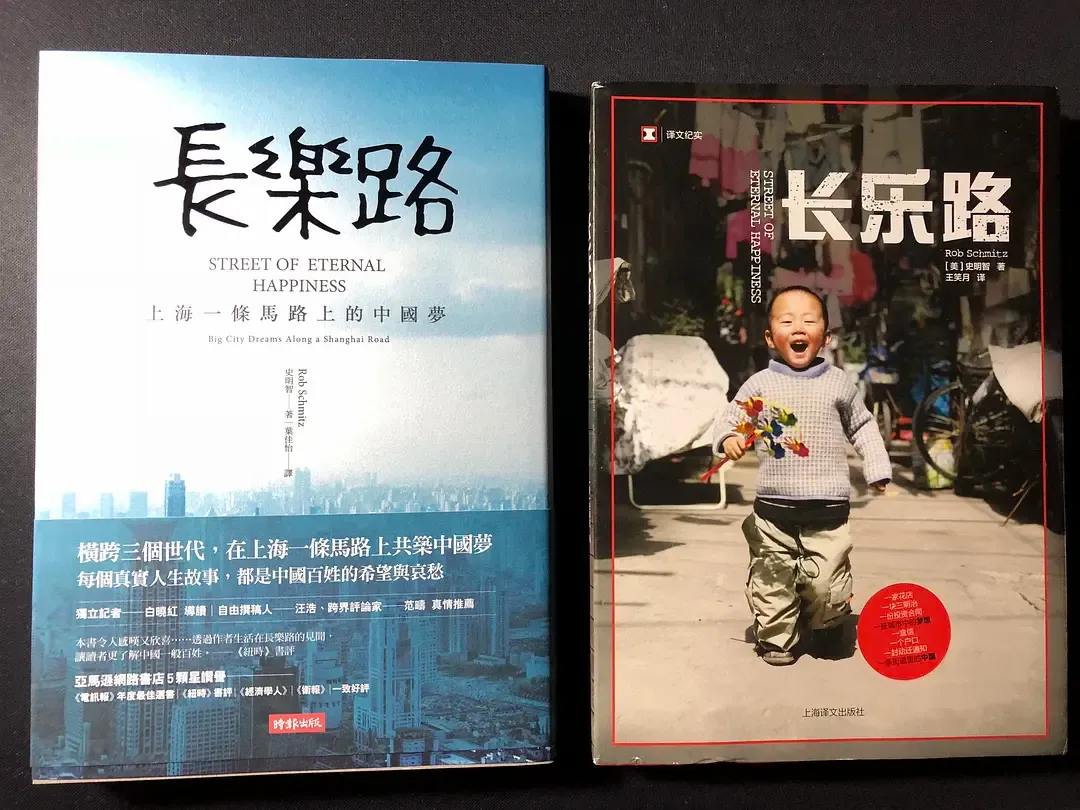
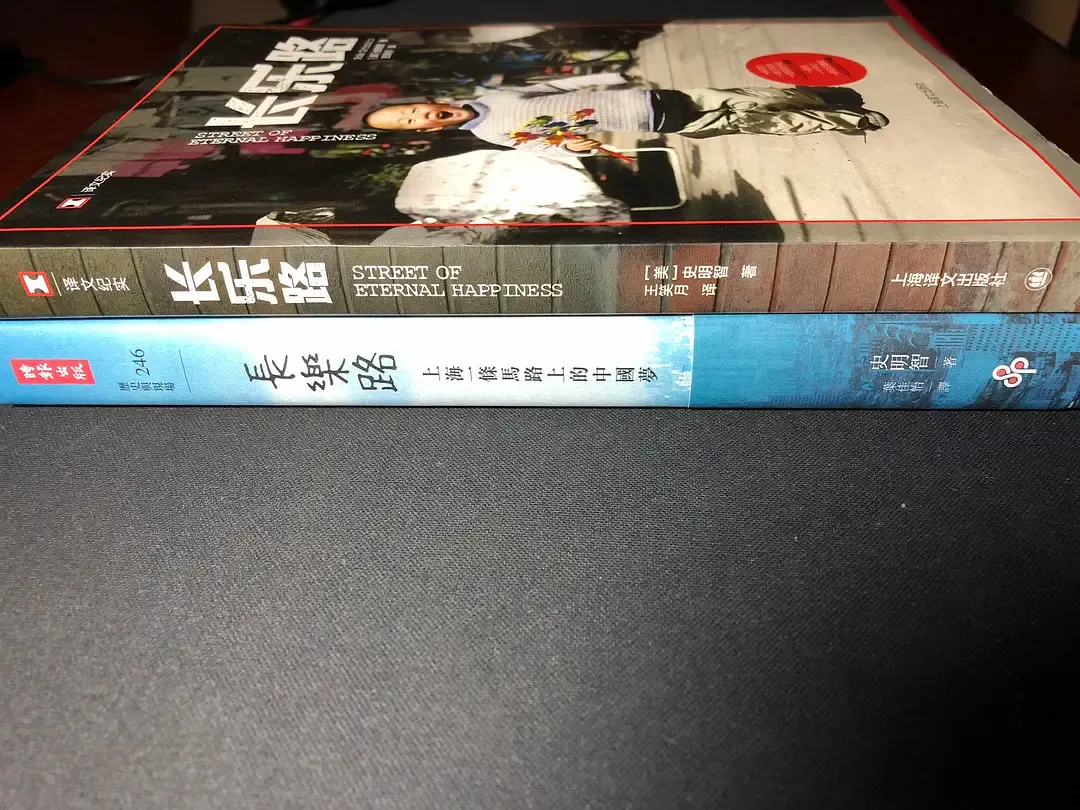
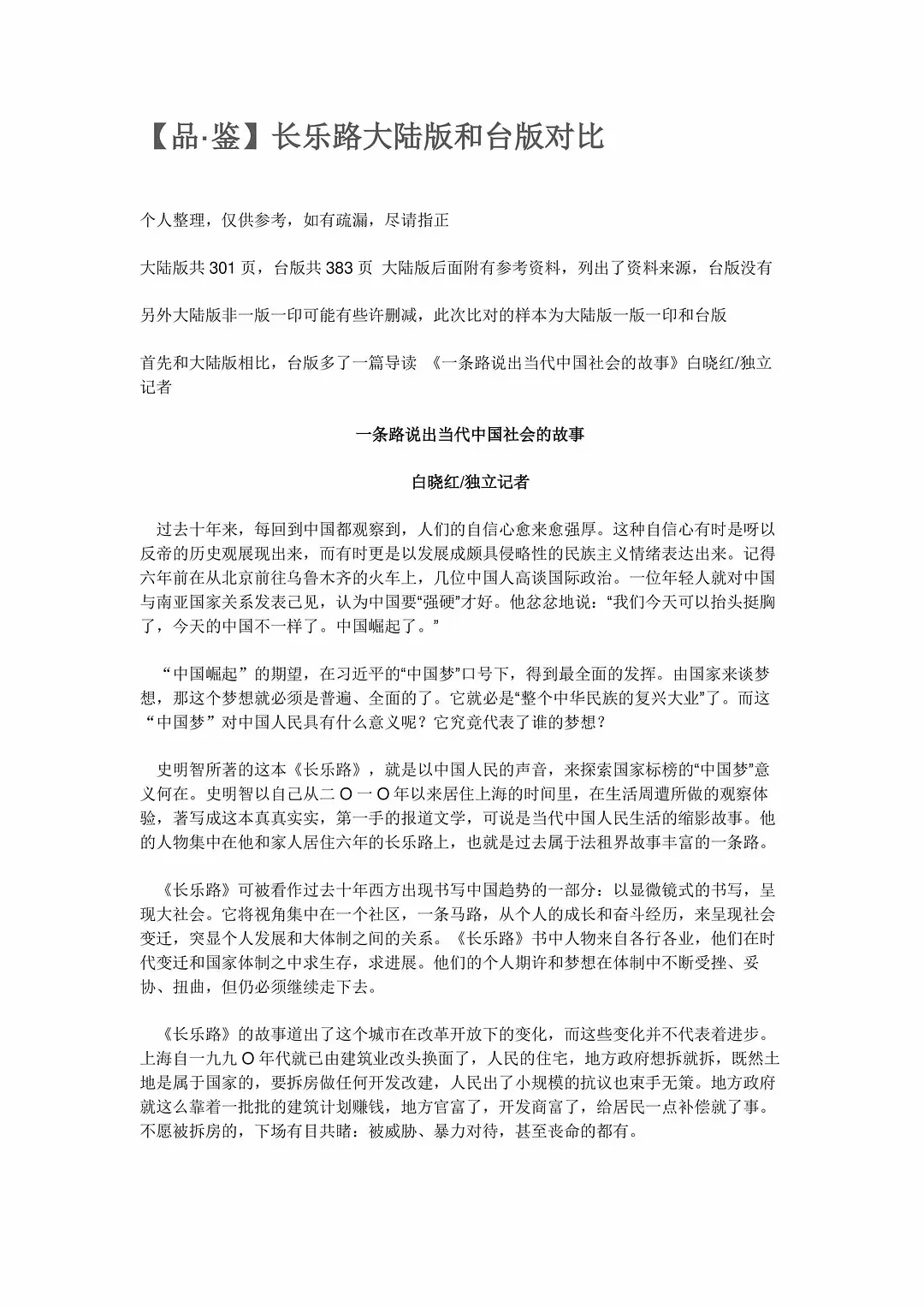
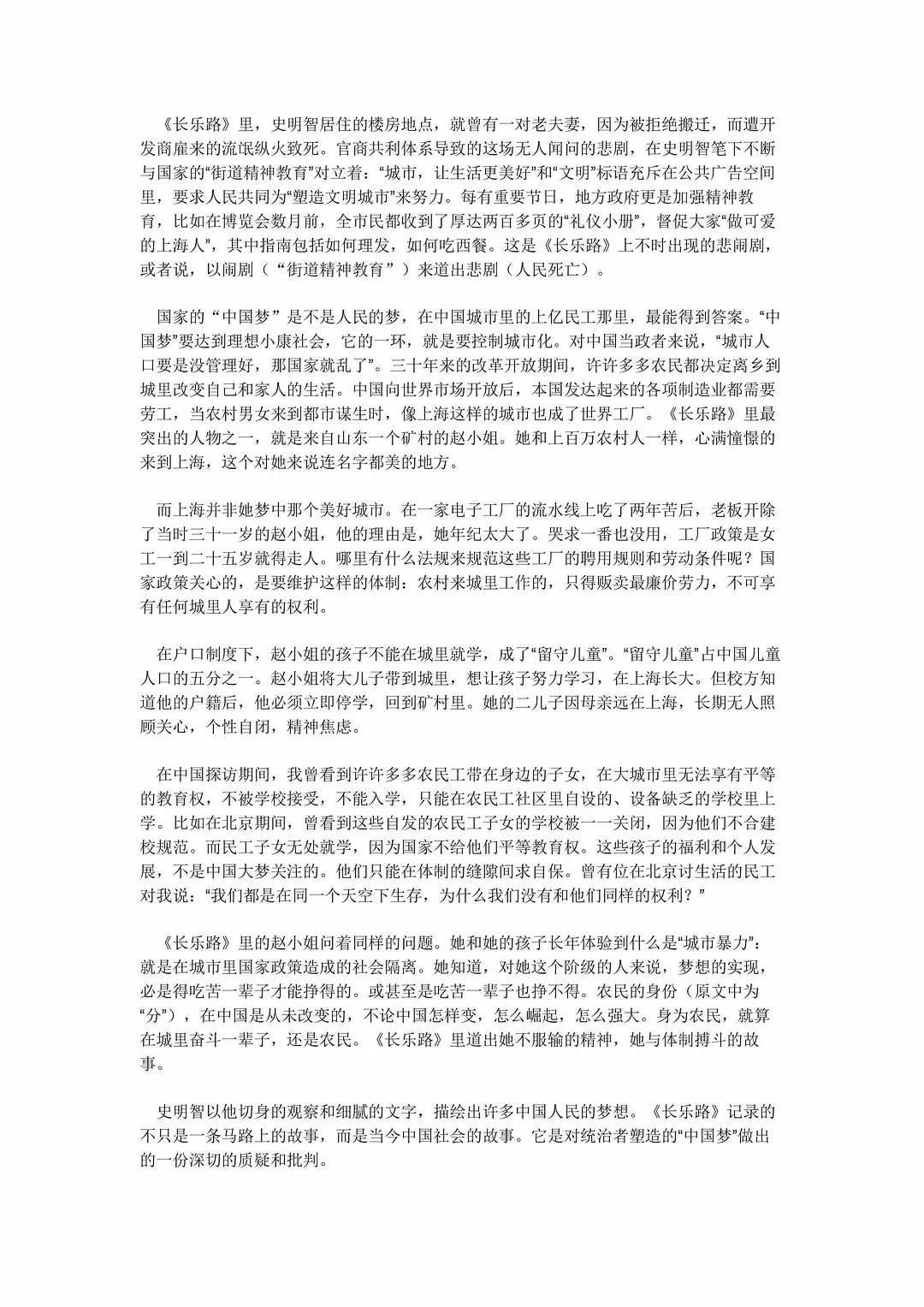
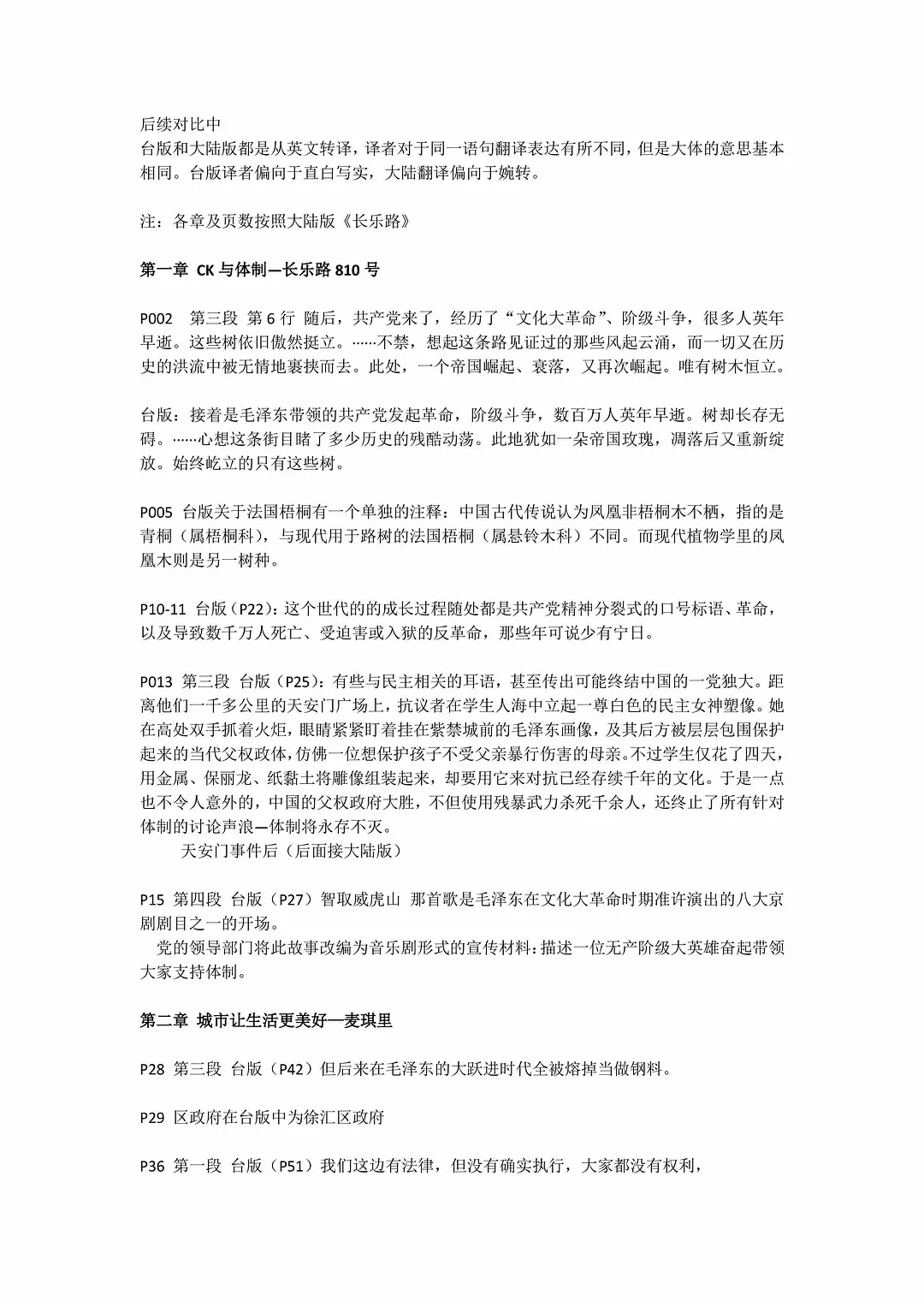
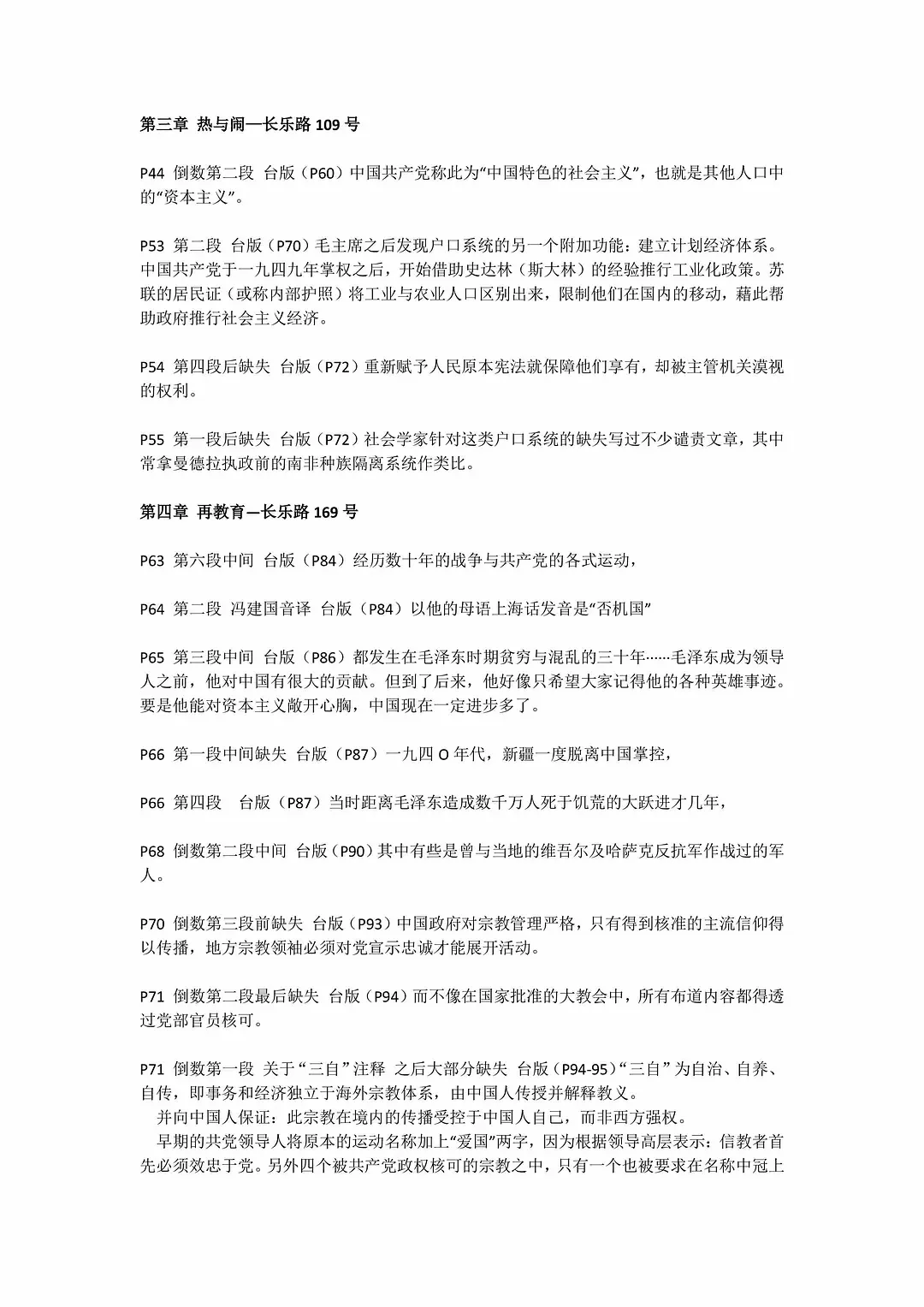
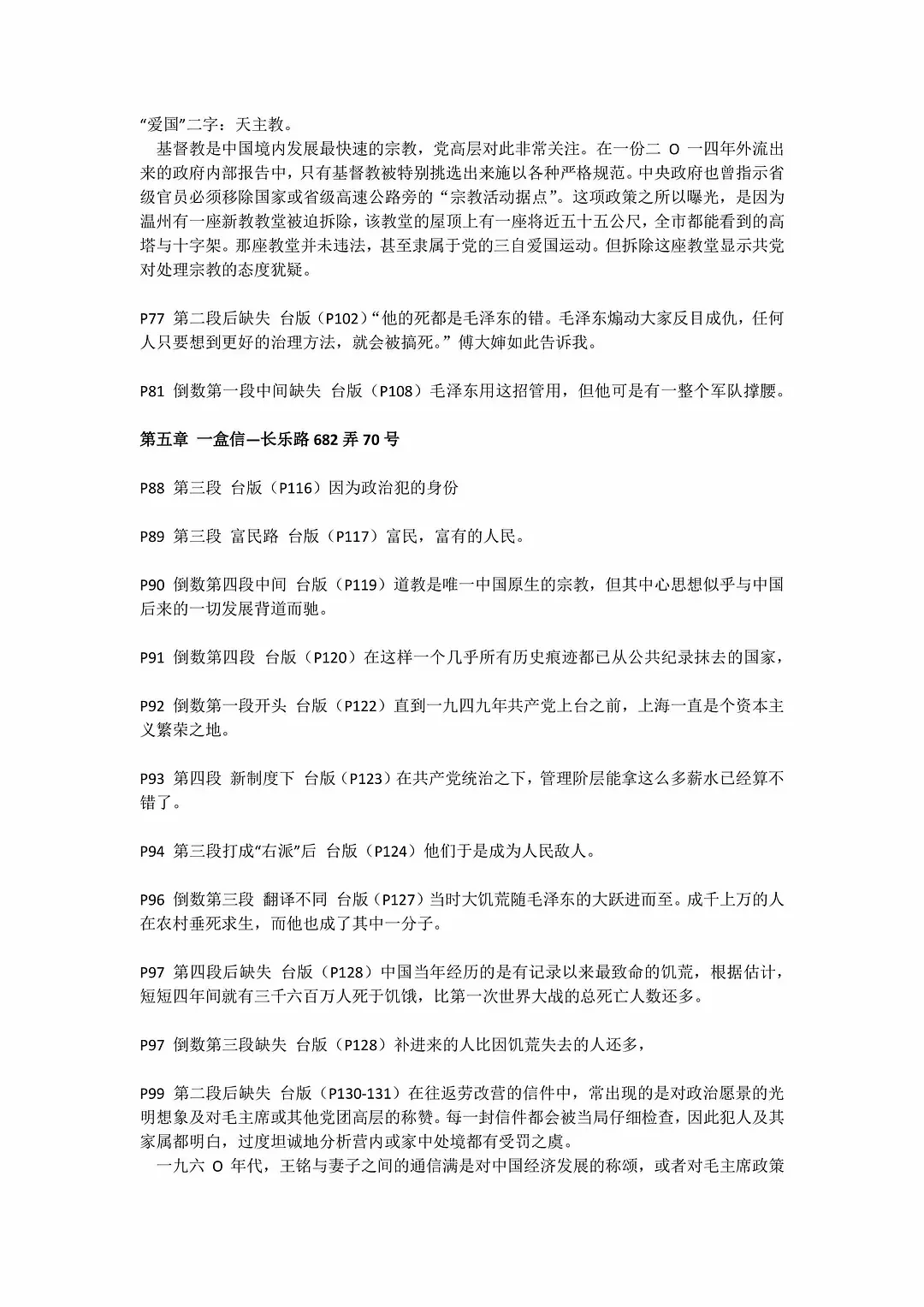
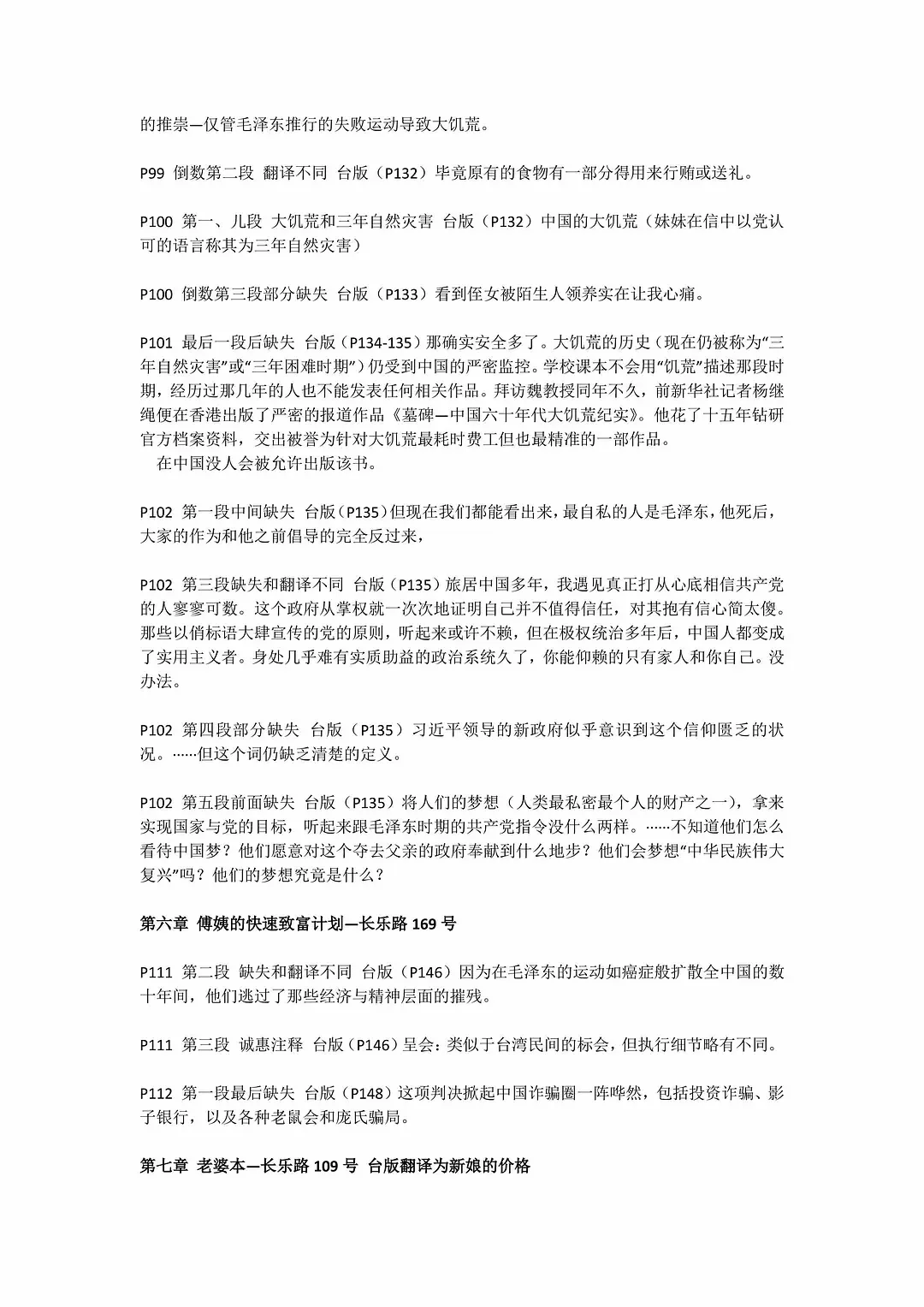
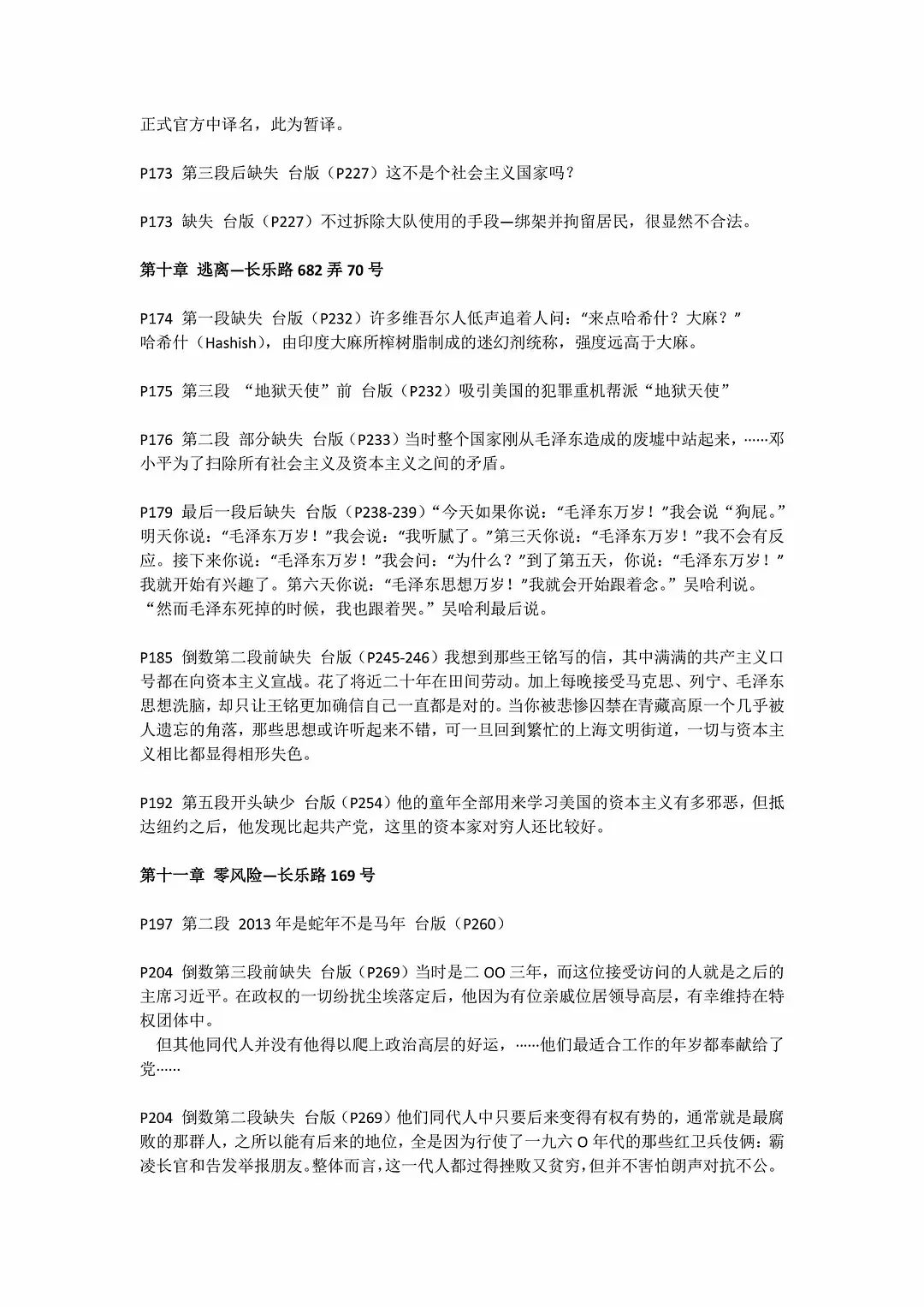
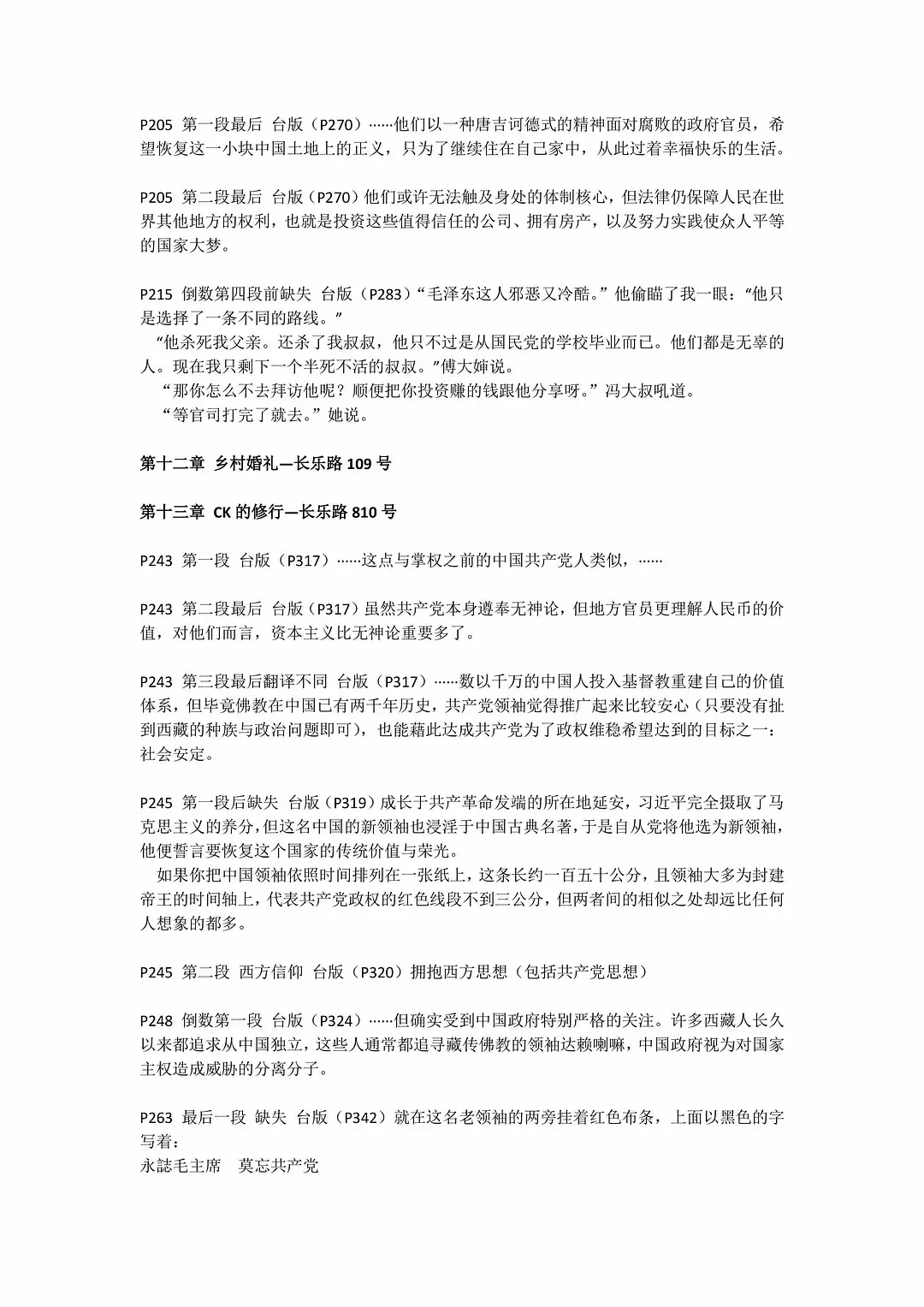
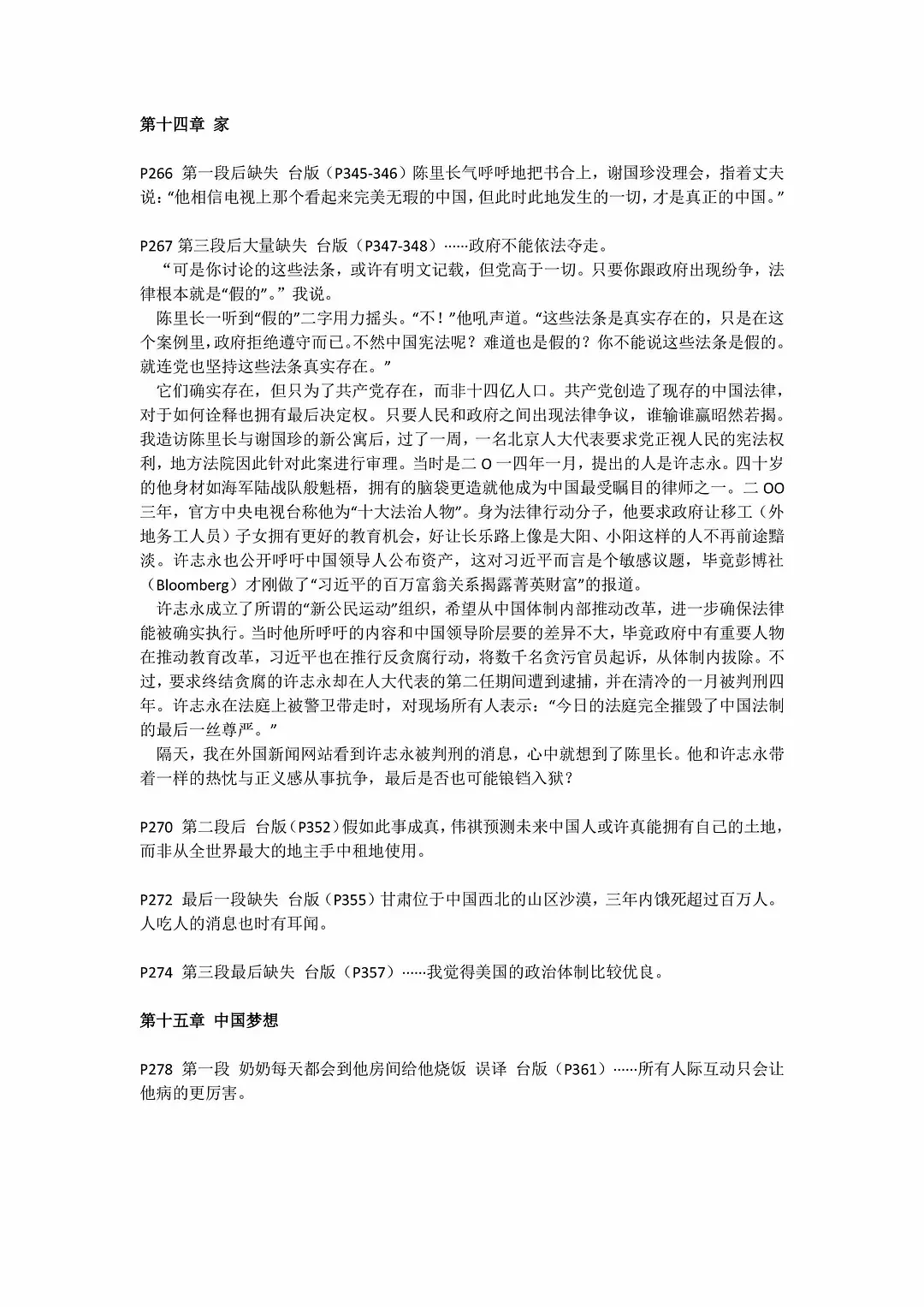
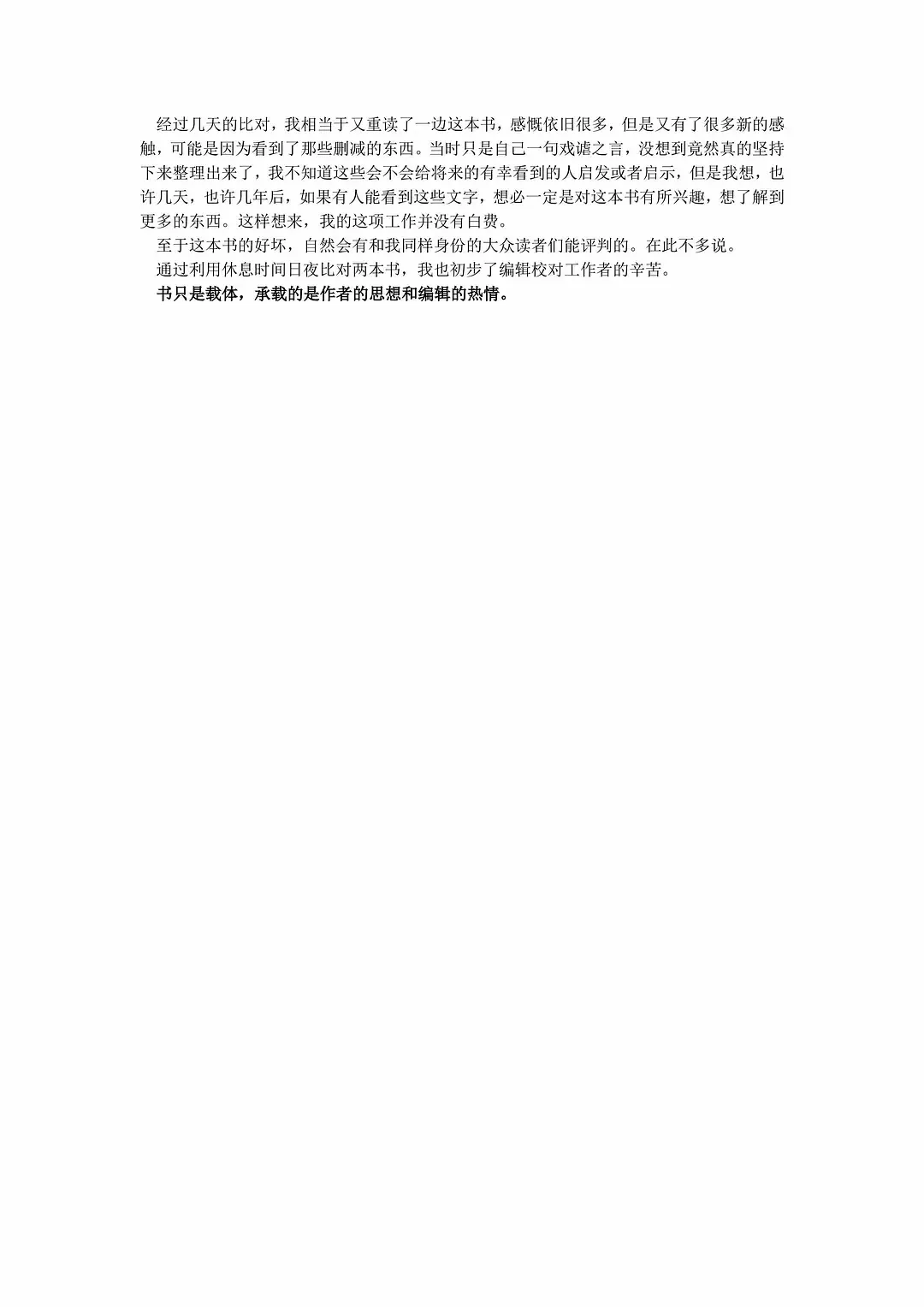
The difference between the two versions has exceeded 10,000 words, and each has its own advantages and disadvantages. The mainland version has a graceful and subtle translation; the Taiwan version has a direct and detailed translation.
Interpretation of Banned Books | Yu Jie: Shanghai is only one step away from Delingha -- Shi Mingming's "Changle Road: The Chinese Dream on a Road in Shanghai"
2022.05.09
Those dreamers, where are they now?
In the early 1920s, the Japanese writer Tsukaze Muramatsu, who visited Shanghai for the fourth time, exaggeratedly wrote in the book "Magic City": "If you walk on the street, you should be regarded as a thief if you are a man, and a thief if you are a woman. Prostitutes." This kind of remark can't be said indiscriminately today, it is a serious insult to China.
Five years after the Revolution of 1911, the Japanese writer Akutagawa Ryunosuke, who came to China, writes reports and sends them back to Japan for publication every day. He ate fried dough sticks, watched "New Youth", and walked the streets and alleys of Shanghai, a city more prosperous than Tokyo. He found that most of the people in Shanghai had the habit of "calling a bureau" (recruiting prostitutes). On the ticket of Yaxu Garden, "the words 'Don't forget the national humiliation' are printed in the corner to encourage anti-Japanese arrogance" - this is the Chinese characteristic: when recruiting prostitutes, do not forget to be patriotic, and when patriotic do not forget to recruit prostitutes. He saw someone buying and selling children on the street, and the other party told him: "The smaller one is three yuan, the older one is five yuan, and if I want a bigger child, the girl from that family is fifteen years old, and I will take it away for fifty yuan. "He met with Li Renjie (Li Hanjun), a radical intellectual who had studied at the University of Tokyo, and talked about his views on current affairs. Li said, "In modern China, there is no public opinion, and without public opinion, there will be no revolution." Four years later, the National Congress of the Communist Party of China was held secretly in Li Renjie's house. It attracted the attention of the patrol room and was transferred to a cruise ship in Nanhu, Jiaxing. One of the participants was Mao Zedong, the "hero" who would change Shanghai and China in the future. Li Renjie was arrested and killed in Wuhan in 1927 by the generals of the Guangxi clan. Shanghai, the most capitalist city, is the cradle of the Chinese Communist Party. This contradictory dual identity still haunts Shanghai to this day.
Nearly 100 years later, NBC reporter Shi Mingming lived in Shanghai for several years and made a series of reports on Shanghai, which has turned upside down. "Changle Road: The Chinese Dream on a Road in Shanghai" is his first book, which uses line drawing to outline the "little dreams" of some Shanghai residents (many migrant workers) who are obscured by the official "big dreams". He does not agree with Xi Jinping's "Chinese Dream", and believes that "Using people's dreams (one of the most private and personal possessions of human beings) to achieve the goals of the country and the party sounds no different from the Communist Party's directive under Mao Zedong." He also found that "there are very few people who truly believe in the Communist Party from the bottom of their hearts. This government has proven time and time again that it is not trustworthy since it took power. It is foolish to have confidence in it." He also found that on the Changle Road, many ordinary people have their own dreams and strive to pursue their dreams, and he optimistically looks forward to the emergence of a beautiful vision for China.
In Shi Mingli's writings, there is Ms. Zhao, who is from a village in Shandong and has worked hard for many years to open a flower shop on Changle Road. Although she could not make her two sons study in Shanghai and take the college entrance examination, she made them half Shanghainese; There is also Xiao Chen, a young man from Hengyang, Hunan. He made his fortune by being the Chinese agent of an Italian accordion company. He opened a foreign-style sandwich shop on Changle Road. Although the shop did not make much money, he hoped that this shop would become a dream. There is also Henry Chen, the planning director of JWT Shanghai branch, the oldest advertising agency in the United States. This young man who grew up in Shanghai and graduated from Fudan University believes that young Chinese people are pursuing individualism in a Western way. , believes that China's cultural roots and heritage make China "invincible"; there is also a heavy-duty fleet of high-level executives and self-made millionaires who travel on their own horses to Tibet and Xinjiang after work. , thus to find a free feeling and passion for life. This side of Shanghai and China is full of vigor, vitality, goodness and beauty, and has an atmosphere of the "Gilded Age" of the United States. Yet, less than a decade after Shi Mingming wrote their story, are they okay in the violent lockdown of Shanghai? Can their dreams continue?
Those who dream of being plundered will not stop fighting
Shi Ming spent more space describing those whose dreams were plundered. Those who pursue their dreams, are realizing their dreams, and have realized their dreams are, after all, a minority; in Shanghai and China, those whose dreams are plundered are the "silent majority", who rarely "break out in silence", but usually "in silence". perish in the middle". Shi Mingming caught up with the outbreak of Shanghai's economic growth. Every day, high-rise buildings rise from the ground, but every day, human dignity is trampled on and human life is destroyed. As Yu Dafu sighed in his book "Sad Journey": "The scenery in Jiangnan is lovely everywhere, and the personnel affairs in Jiangnan are sad."
Shi Mingming told the story of the forced demolition of Maqili, despite the residents' persistent struggle for many years, but they could not resist the government's strange hand. There are only a handful of public services provided by the government, and the only thing that interests them is to sell land for money. On January 9, 2005, three violent demolition hooligans set fire to various places in Maggie's to drive away the residents who refused to relocate. Zhu Shuikang and Li Xingzhi, a couple in their seventies who lived here all their lives, were burned into two charred corpses in the house. Zhu Shuikang was a veteran who participated in the war to resist US aggression and aid Korea. They were burned to defend private property, along with Zheng Nanrong, who set himself on fire in pursuit of freedom of speech and Taiwan independence, along with Caiwang Luobu, a Tibetan singer who set himself on fire in front of the Potala Palace in protest of CCP tyranny (and hundreds of others who set themselves on fire). Tibetans) is also "born great and died honorably". On the day when Shanghai becomes a free port or a free state in East Asia in the future, and the day when Shanghai resumes the free order and governance of the Ministry of Industry, the statues of Zhu Shuikang and Li Xingzhi should be erected.
Shi Mingming has been following the "nail households" Chen Lichang and Xie Guozhen for many years. After insisting on it for several years, their house was still torn down and everything in the family disappeared. They went to the Xuhui District Government to protest: "The Japanese in the 1930s didn't take my house, neither did the Kuomintang in the 1940s, it even survived the Cultural Revolution. But now a bunch of outlaws are like that. Take it away.” They wrote in the protest letter: “As long as you have power, you can trample the system, insult the people, and violate the people’s human rights. We are too naive to believe the newspapers and TV reports and mistrust the government. A promise made to the people. You can take away the people's land, but in the end you will lose our trust, and trust is the cornerstone of the country." Chen Lichang burst into tears in front of Shi Mingzhi's face: "We lost our dignity, we lost A sense of security. There is nothing left. The government is talking about the Chinese dream, but whose dream is it?"
Shi Mingming also wrote the story of 61-year-old Xi Guozhen, who regards petitioning as a pillar of her life. When the forced demolition occurred, she was carried away by the demolition personnel, her fingers were broken, and her husband was trapped in the house, which soon caught fire. Officials later claimed that her husband had set himself on fire, and she believed that he was beaten to death and then set fire to annihilate the evidence. She repeatedly went to Beijing to petition, and was arrested, detained in a black jail, beaten as a routine, and her body quickly collapsed. After her son Weiqi went through this disaster, he studied hard and was admitted to Cornell University in the United States and obtained a Ph.D. in economics. His research topic is China's real estate and capital flow. His father died for it, and his mother fought like Sisyphus for it all his life. After studying this issue, he concluded that the Communist Party's respect for private property will determine its success or failure: "Once the government knows how to respect private property The concept of property also has the opportunity to cultivate a group of powerful people who do not have to worry about their own safety. After a period of time, this group of people will become relatively rational and will learn to compromise with each other in order to build a better country.”
When Shi Mingming interviewed Weiqi, Weiqi was working for a multinational company in Hong Kong. His mother was not allowed to leave the country because of the petition's "criminal record" and the "stain" in the file, and was unable to visit her son in Hong Kong. Wei Qi came to Hong Kong to work, mainly because he wanted to be closer to his mother, so that he could go back to Shanghai to visit his mother in a two-hour flight. He looks forward to China's future for the better, assuming that the rulers are as rational as he is, even if they are ruthlessly self-interested. However, the Xi Jinping regime is irrational and in less than a few years has destroyed the freedom and rule of law that had been established in Hong Kong for over a century of British rule. I wonder if Wei Qi has left Hong Kong and returned to the United States now?
A new movement of the state to advance and the people to retreat, and to turn the private into the public is being vigorously launched in China. One of the most significant cases is: In July 2021, Sun Dawu, founder of Hebei private enterprise Dawu Group, was sentenced to 18 years in prison. On April 15, 2022, its assets were auctioned, and assets valued at over RMB 5 billion were sold at the reserve price of over RMB 600 million. Sun Fushuo, Sun Dawu's son, wrote in an open letter to Xi Jinping: "I cannot explain the magical reality that the Dawu case has been politicized, sensitized, and demonized." , distress and concern”, referring to the forced auction by the judicial authorities, which is not only extremely irresponsible to enterprises and employees, but also damages the interests of fund-raising participants. However, these protests have been barking like a train, and Xi Jinping has turned a deaf ear. The protection of private property rights in China is just empty talk.
When religious belief is reduced to pretending to be a ghost, it is like a pyramid selling organization
Xi Jinping's "Chinese Dream" cannot settle the souls of the Chinese people, and a "Battle for Chinese Souls" is being fought. The American human rights organization Freedom House has released a report on this subject, examining the evolution of the CCP’s religious control policies and how citizens respond to these policies. Cook, one of the report's authors, pointed out: "The strict control of the Communist Party has made it impossible for official religious institutions recognized by the state to meet the needs of Chinese society for religion. As a result, there is a huge religious black market in China, forcing many believers in the law. People who engage in religious activities outside the country regard the regime as unreasonable, unjust, and illegal. They include both Taoists, Christian Protestants, and Tibetan Buddhists." He believes that in the long-term battle for Chinese souls , the ultimate failure will be the Communist Party that refuses to reform.
Zhang Yan, a Pulitzer Prize winner and former New York Times correspondent in China, has a book titled "The Soul of China: Religious Revival in the Post-Mao Zedong Era." Feng Shui master who held funeral ceremonies in the countryside to see the tomb, intellectuals who studied Qigong and Sinology, and pastor Wang Yi of the Chengdu Reformed Church Autumn Rain and the congregation. In his writing, these people are basically true believers, believing that their religious beliefs can make them better, connect them with a higher concept and existence, and even help more people and improve the decay of public life . Without religious belief, China would become very scary. He Huaihong, an ethic scholar at Peking University, said frankly: "Barbarism and cruelty are stacked in our daily life." Zhang Yan made this observation: "In the new era of prosperity, there is a hidden There is an undercurrent of anger and violence, and people can feel this even more on the Internet.” But as one commenter pointed out, Zhang Yan wrote about the sunshine of the revival of religious life in China, but consciously or unintentionally avoided the shadows— This book seems to only write about the "top half" of the world of Chinese religious beliefs, while the more subtle, detailed but intertwined "bottom half" is still hidden in the shadows.
Shi Mingzhi's "Changle Road" does not focus on the religious life of Shanghai citizens, but touches on this aspect in some chapters. He is a highly rational atheist, does not agree with the mainstream Western religions such as Christianity introduced into China, and is even less interested in traditional religions such as Buddhism in China. However, he found that China was in a deep moral crisis, the government was unable to provide a way out, and the people spontaneously sought spiritual resources that could "relieve". When he described the religious life of the Shanghainese, he focused on the negative and absurd (perhaps he just observed this).
Aunt Fu took Shi Mingming to an unofficial charismatic church meeting. He lined up for dinner with the church members, as if he was in a big family. "Everyone behaved very civilly, no one pushed, spat or cut in line. , but he doesn't like the trendy songs sung by five women in black miniskirts on stage, and he also rejects the form of the congregation standing up and applauding, raising their hands, closing their eyes and clenching their fists, thinking it is a bit like the soul of the American South happy. It is said that the preaching of Pastor Jiang, who was a criminal and wore a Rolex watch, made him even more disgusted: "The content of Pastor Jiang's sermon has obviously been said dozens of times, maybe even hundreds of times, and it has been used as a joke. The words and rhythm are very perfect....His speech has a special rhythm, the rhythm of one answer and one answer, which is even more irresistible. For people like Aunt Fu or other old enough people, it will also remind them By the time of political rallies in the 1960s, thousands of Red Guards were shouting slogans like 'Long Live Chairman Mao' in unison. Such repetitive words can trigger a hypnotic effect." Aunt Fu aside from attending church , is also keen to participate in MLM activities, and took Shi Mingli to the MLM organization for interviews, trying to develop him into an offline but unsuccessful. In fact, what is the difference between a church that deviates from the truth and an MLM organization?
Shi Mingming also visited the "New Knowledge of Chinese Studies" research center in the alleys of Changle Road. Its founder, Xu Yuan, said that just two years after the center was established, more than 50,000 young people have participated in the activities organized by them. He hopes to let young people re-understand Confucianism, especially the concept of filial piety. Shi Mingming noticed that the title of its promotional poster is "Chinese Dream, My Dream", and these six characters indicate that Confucianism or Sinology is intentionally advocated by the CCP authorities. Like his predecessor, Nan Huaijin, who was a household name in China, who Zhang Yan once wrote about in his book, he had a profound understanding of the essence of Confucianism serving power, and took the opportunity to make a fortune.
Xiao Chen, who owns a sandwich shop, took Shi Mingzhi to a temple in the outer suburbs. The host is a low-key Tibetan Buddhist monk. Most of the believers or their families are suffering from incurable diseases that cannot be solved by Chinese and Western medicine, and they come to seek help. Master's dialogue with believers is like a doctor diagnosing a patient. He proposes an unconventional diagnosis and treatment plan: buy turtles and release them, or go to Mount Putuo to worship Guanyin, or stop taking medicine. The master confidently told a mother who wanted to solve her daughter's autism problem, "I asked those doctors in Beijing to check their heads. It was them who sounded wrong." In the process of communication between masters, this religion has undoubtedly become a juggling trick.
From "Shanghainese in Delingha" to "Shanghainese in New York"
One of the most moving stories in this book is that Shi Mingming accidentally found a package of personal letters more than half a century ago. The person who wrote the letter was Wang Ming, a small capitalist in Shanghai who was arrested in 1957. The thirty-five-year-old Wang Ming was sent to the Delingha Laogai Farm in Qinghai, 1,600 kilometers away, and was not released until Mao Zedong died. In an era when letters were closely censored, family correspondence for two decades usually began with a copy of Mao's quotations. In the beginning, it was Wang Ming's sister who wrote back to him, and his wife had to pretend to cut ties with her husband in order to struggle to survive in Shanghai with the children. Ten years later, Wang Ming received a letter from his wife, begging to be mailed the pictures of the child, as well as the previous photos, especially the "big group photo of me still at home", "Every time I am depressed, I will read you carefully over and over again. Letters and photos, it's good for my health." This is really making people want to cry without tears, listening to thunder in a silent place.
Here, I saw the place name Delingha. The first time I knew this place name was in the lyric poem "Sister, Tonight I'm in Delingha" by Haizi, a poet on the campus of Peking University: "The night is shrouded / Sister, I have only the Gobi tonight / At the end of the grassland I am empty / I can't hold it in grief A teardrop/This is a desolate city in the rain/Except for those who pass by and live in." At that time, I was a romantic young literary man, full of beautiful imaginations of Delingha. Later, I saw the place name again in the autobiography of human rights activist Wu Hongda, who was also detained nearby, and whose autobiography was full of details such as devouring a snake that froze in winter. Later, I learned that Delingha comes from the Mongolian "Ariteng Delingha", which is translated as "Golden World" in Chinese. The totalitarian government of the Communist Party of China has made the "Golden World" of the Mongolians into the East of the Nazi concentration camp. The version of the labor camp, as a Mongolian, how can I not be angry and sigh in the sky?
Wang Ming was fifty-seven years old when he was released back to Shanghai, and his application for rehabilitative work was rejected. His family resented him, and he later died alone in a nursing home without his wife and children attending his funeral. The fate of him and Wu Hongda is the epitome of a whole generation of Shanghainese. People more tragic than them have already died in many well-known and unnamed labor camps such as Delingha and Jiabiangou, and there is no cemetery. Those Shanghainese who loved capitalism the most, freedom and independence the most, were wiped out. In the second half of his life, Wu Hongda, who established a museum named "Labor Camp" in the capital of the United States, accidentally drowned while on vacation in Honduras in 2016, symbolizing the generation of labor camp survivors who escaped into the depths of history.
The story of Wang Ming's children continues. Wang Ming's fifth daughter immigrated to the United States many years ago. Twenty years later, in 2008, Wang Ming's youngest son Wang Xuesong and Wang Ming's wife Liu Shuyuan immigrated to New York through relatives. The tragic story of "Shanghainese in New York" finally turned into a comedy story. The streets of Flushing are not as majestic as those of Shanghai, but here, the Wang family can at least enjoy "freedom from fear". Shi Mingming met Wang Xuesong at the Flushing Library, who was working hard to learn English and get a technician qualification. Shi Mingming photocopied all the letters to give him, but he refused to accept them, saying that no family members were willing to keep and read these materials, and the next generation would have little interest in that history. Chinese people originally believed in history, but now they regard forgetting as the premise of survival. The Shanghai native, who was implicated by his father for most of his life, left all his regrets and pains in Shanghai, and worked hard to start the second half of his life in the United States. Now, when he sees all the tragedies in Shanghai's closure, he may be glad that he left when China's national power was at its peak and Shanghai's economy was developing the fastest. The place in Shanghai that cannot protect private property is not his home, only the United States is his home.
Shi Mingliang's expectations for Shanghai and China were all in vain. Instead of leading China to greater wealth, freedom and happiness, Shanghai has not been able to lead the way. On the contrary, the specter of totalitarianism has once again drawn Shanghai into a terrifying black hole, as it did in 1949. The various Shanghainese that Shi Mingming wrote about in the book do not know who can escape this catastrophe without material and spiritual damage. After the book was published, the stories that continued to happen to them must have made people "mourned for their misfortune and angry with them."
Like my work?
Don't forget to support or like, so I know you are with me..
Comment…